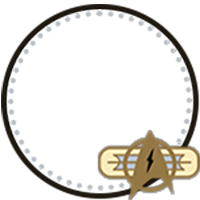Torias Alven had been on enough routine flights to know that nothing described as routine ever was. Especially when he was only doing it for administrative reasons. As an investigator, he needed to clock up a certain number of hours piloting runabouts to retain his clearance. So it was with a certain amount of grumpy frustration that he requested to join a routine telemetry sweep within the Paulson Nebula.
It was supposed to be over in six hours. Instead, the environmental controls had begun humming a nervous tune in hour three. Alven sat at the forward console, staring at the status display with the weary patience of a man who had already lost too many arguments with starship hardware.
Ensign Mora, who had drawn the short straw to serve as co-pilot, looked up from her readings. “Commander, the life support sensors are showing anomalous carbon dioxide levels. Nothing dangerous, just higher than expected.”
“Great,” Alven said. “Maybe we’re just breathing heavy. I’m getting older. Must be unfit.” He ran a diagnostic, but the console blinked back at him in smug indifference. No faults, no power spikes, no sign of anything that should make the air go stale. Which, in Alven’s experience, meant the technology was gearing up to make a fool of him. He always preferred sentient life. He understood that messiness, criminal or victim, witness, bystander. But he had never, before or after the Academy, felt any affinity with technology.
A faint scratching sound came from the starboard access panel. It was quiet at first. A tiny, rhythmic skittering, like static electricity. Alven ignored it for a solid thirty seconds, which was as long as professionalism could manage, before sighing and kneeling to open the panel.
Something small and fuzzy blinked back at him. It chirped.
Alven closed the panel slowly. “Nope. Didn’t see that.”
Ten minutes later, he had seen it again, and three more like it. All rolling out of the panel which now resolutely refused to close.
Tribbles.
He did not even bother to ask how they got aboard; the answer would only irritate him. The transporter logs showed nothing unusual. The cargo manifest listed bio-neural gel packs for replicators on Starbase Bravo. Alven was beginning to suspect that the gel was not the only thing replicating. The creatures had multiplied with terrifying efficiency, turning the storage compartment into a low-budget carpet with purring.
Ensign Mora, clutching a tricorder like a phaser, was beginning to look panicked. “Sir, they’re everywhere.”
“Yes,” Alven said dryly, “I’ve noticed.”
The creatures were soft, round and emitted a soothing coo that would have been charming in small doses. But hundreds of them were producing a chorus so cloying it bordered on psychological warfare. Every time Alven tried to herd them into one compartment, they cheerfully rolled out again, as if mocking the very concept of containment.
He tried reason next. “Alright, furballs, you’ve had your fun. Back into the storage compartment.”
They blinked up at him. One purred louder.
“Fine,” he muttered, interrogating his symbiont’s memory for any helpful advice and coming up nil. “Great help you lot are.”
Within an hour, the entire aft section of the runabout looked like a moving shag carpet.
By this point, Mora was pale and trembling. “Commander, the environmental filters are clogging. If we don’t get them out, we’ll lose air circulation.”
Alven pinched the bridge of his nose. “So, suffocate in tribble fur or we dock and infest the entire starbase?”
He needed a solution that did not involve earning the ire of over a 100,000 people or death by suffocation. Then he remembered something one of his earlier hosts had read while preparing for a trivia competition. The Klingons had used sound to drive tribbles off their ships.
He waded through the carpet of tribbles. Stepping on some and feeling a little guilty that his lack of balance made his steps heavy. Reaching the console, he tapped a few queries and found the information he wanted.
“Computer,” he said, “set the sound emitters within the runabout to resonate at the calculation on screen.” He kicked a bunch of tribbles away from his body and turned back to the ensign. “That’s roughly equivalent to the frequency of a targ’s stomach growl.”
Mora blinked.
“Just trust me,” Alven said.
The ship began to hum. A deep, unsettling note that Alven felt reverberating through his body. The tribbles froze mid-purr. Then, in perfect unison, they shrunk in on themselves and rolled into the open storage compartment like a fuzzy tidal wave of panic. Within minutes, the entire infestation had compressed itself into the storage compartment and was a silent, still wall of condensed fur.
Alven sealed the compartment with a containment field and exhaled for the first time in an hour.
“Congratulations, Ensign,” he said, slumping into his chair. “I think we’ve saved ourselves from being the punchline.”
She nodded shakily, still watching the sealed compartment. “What do we do with them now?”
“We head back to the starbase confident in the fact that they’re now someone else’s problem.” He smiled, a sense of satisfaction. “Computer, stop emitting the noise.”
A faint chirp came from under the helm console. He leaned down and saw one small tribble, its fur slightly static from the sonic barrage, staring up at him with something approaching defiance.
Alven sighed. “You survived the targ song. Good for you.” He picked it up, setting it on the console.

 Bravo Fleet
Bravo Fleet








